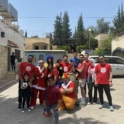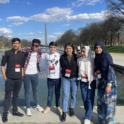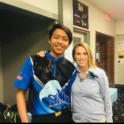West Bank YES alumni organized a GYSD event for orphaned children.
STORIES
Teaching Citizenship Rights in Yemen – Elections 101

By Mohammed Emad Sakran, YES 2008-2009, Yemen, hosted by PIE in Kaplan, LA
I strongly believe, as many other Yemenis, that Yemen, despite being one of the oldest civilizations in the world, has never had a fair or free election. Presidential candidates have never provided the public with their complete campaign program or given the electorate a complete understanding of the candidate’s political platform, including where they stand on the issues and how they will work to resolve them. If the political process was more transparent, the Yemeni people would be able to hold the elected officials more responsible.
Through my time as a YES student, and as an international student at the University of Calgary, Canada, I have learned about political processes and especially what it takes to have fair elections. Throughout 2014, I had the opportunity to attend online training through the YES Alumni Transformational Leadership Training (TLT) workshop, and in May, I attended a three-day in-person workshop in Amman, Jordan. The TLT gave me a chance to create and implement a project in my community in Aden, Yemen during the summer of 2014, which is how I started Election Campaign 101. This project provided local citizens with basic election knowledge, like a condensed version of a typical university political science course, “Campaign 101.”
Twenty-one participants attended the Elections 101 workshop. The workshop provided them with a complete guide on how to prepare and run an election campaign. It provided the participants with the resources and materials needed to research and design campaigns and programs from many different fields including economic, health, education, welfare, political participation, and marketing. The training was delivered by various experts and knowledgeable professionals in the field.

The project took a great deal of work, which required a strong team. In total, eight team members worked to make this event possible. Team members included activists and knowledgeable people in the political field in Yemen, as well as those with important connections in Yemeni civil society. Some of the team members held leadership positions with different non-governmental organization, NGO’s and local social associations.
Our aim for this training was to raise awareness of the importance of delivering election campaigns to the public, emphasizing the impact it would have in holding presidential candidates reliable for their actions after assuming presidency. We also highlighted how important it is that the younger generation, and the population as a whole, be politically active. The project consisted of a planning phase, a development phase and finally, an implementation phase. During the planning phase, we followed a precise method for carefully selecting participants for the workshop. Our selection team used their connections to distribute our training applications to the most qualified students in seven universities. The applications were reviewed carefully and the most qualified participants were called in for personal interviews before the final 21 participants were selected.
In developing the material we used for the training, I reached out to Dr. Mohammed Hesham Basharaheel who is the head of the National Democratic Institution (NDI) office in Aden, and he was able to provide us with some materials that are used by the NDI when conducting similar trainings. Our research team, a group of qualified new university graduates, worked together to create our training materials and curriculum using the resources provided by NDI and various other sources. Trainers and guest speakers were contacted, and our partners at the Wogood for Human Security Foundation (WHS) and the Youth Council were also working hard to get the workshop ready.
The event took place at the offices of the Wogood Human Security Foundation with Dr. Maha Awadh, WHS Chairwoman, welcoming the attendees. She stressed that training programs like Elections 101 are critical in our country's current situation, and she also expressed the importance of youth getting involved. The workshop moved on to a robust discussion on how to conduct an election campaign, which covered how to complete the following steps: research to prepare for a campaign, set a strategic campaign goal by calculating the number of votes needed to win, analyze and target voters, develop a campaign message, and develop and implement a voter contact plan. Participants engaged in discussions about how to assess the political landscape, analyze factors affecting the elections, analyze candidates’ strengths and weaknesses, strategically target voters by demographics and geography and then conduct a voter analysis post-election. At the end of the day, most participants were satisfied with the training program and the program was reported to be a success. Many of the participants expressed that they had a lack of knowledge in most of these topics.

After the event, we read the participants’ evaluations and learned that, prior to the training, many participants could not differentiate between political parties and religious ideologies. When participants were asked to rate their political orientations on a scale from 1 to 10, most identified themselves as leftists, ranging from 8 to 10. Most participants agreed that Yemen is a society dominated by the older generation, but they hoped that it would be influenced by the younger generation which constitutes the biggest segment of the Yemeni population. They identified that the most important issues for both the country and for political parties when designing campaigns should be poverty, illiteracy, modernization, personal rights and freedoms, differentiation between religion and politics, religious coexistence, opportunities for youth and unemployment.
Despite the many political difficulties Yemen is facing today, my hope is that the Yemeni youth will focus on a long term vision to better their country by educating and empowering themselves as citizens with rights and responsibilities. My thanks to the YES Program for their support of the Election Campaign 101 project.






